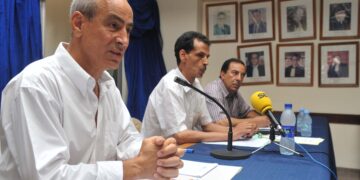Royce used his congressional experience to facilitate access for the Egyptian and Saudi Arabian governments despite their well-documented rights abuses
(Washington D.C., February 10, 2022) – Ed Royce, a lobbyist for Egypt and Saudi Arabia at Brownstein Hyatt Farber Schreck, is contributing to, and benefiting from, human rights violations by using his high-level access to ensure continued U.S. support for their systematically abusive governments, said Democracy for the Arab World Now (DAWN), in a new profile published today investigating Royce's lobbying work.
DAWN, Freedom Forward, and the Quincy Institute urged members of Congress to publicly pledge not to meet with Ed Royce – or any other lobbyist working for abusive governments in the Middle East – and to act urgently to ban their access to U.S. government officials.
"Lobbyists like Ed Royce are whitewashing the crimes of autocratic Middle Eastern governments and using their access to persuade the U.S. government to support them despite their massive and well-documented human rights abuses," said Raed Jarrar, Advocacy Director of DAWN. "We need to hold Ed Royce and other lobbyists like him accountable, and members of Congress should refuse to meet with them to listen to their propaganda."
Edward "Ed" Royce, a former congressman from California from 1993 to 2019 and Chair of the House Foreign Affairs Committee from 2013 to 2019, is now Policy Director for Brownstein Hyatt Farber Schreck, where he represents the Ministries of Foreign Affairs for the abusive governments of Egypt and Saudi Arabia. At Brownstein,Royce has used his political contacts and influence to arrange meetings, including briefings and calls, for the Egyptian Ministry and for the Egyptian Ambassador to the United States Motaz Zahran with members of congress and their staff. These meetings came at a time when Egypt was urgently lobbying the U.S. government to secure continued military assistance of $1.3 billion dollars, of which Congress had withheld $300 million. The Egyptian government succeeded in reducing the amount withheld by the Biden administration to $130 million. Ed Royce and Brownstein have declined to respond to requests for information about the exact substance of the meetings they arranged for the Egyptian government during this time.
Ben Freeman of the Quincy Institute stated, "Ed Royce is the epitome of the revolving door. He's basically traded years of public service for a paycheck from dictators. If you're a sitting Member of Congress, is that really the type of person you with whom you want to be meeting?"
Securing access to lawmakers has been crucial to the Egyptian government's efforts to whitewash its abusive tactics and obscure the country's ongoing human rights crisis, which include systematic and widespread torture, mass unlawful detentions, and extrajudicial executions
Royce's high-level access also has been crucial to the Saudi monarchy, which Royce added to his portfolio at the firm in August 2021. Brownstein has worked as an agent for the Saudi government since 2016, despite its record as one of the worst abusers of human rights and international humanitarian law in the world. It has represented the Saudi government at a time when the government sought to restore its standing with Congress, which voted on four occasions to end arms sales to Saudi Arabia in light of its war crimes in Yemen and 2018 murder of U.S.-based Saudi journalist Jamal Khashoggi. The firm received $1.8 million from the Saudi government in 2020, the year that Royce joined the firm. In December 2021, Congress approved new arms sales to Saudi Arabia, after a bipartisan effort to block the deal failed.
"Ed Royce and his firm have a legal duty to stop contributing to, and benefiting handsomely from, the abuses of the Egyptian and Saudi governments, as part of their own business and human rights responsibilities," said Raed Jarrar, DAWN's Advocacy Director. "They should drop their contract with these autocratic regimes, and ensure that they conduct a thorough due diligence review of future clients to ensure they no longer enable and abet grossly abusive governments."
Over 5,000 U.S. citizens and residents have signed a petition circulated less than two days ago by Freedom Forward calling on Royce to end his contract with the Egyptian and Saudi Arabian governments.
"No lobbying firm should cross the red line of representing an abusive dictatorship," said Sunjeev Bery, Executive Director of Freedom Forward. "Professional lobbyists like those at Brownstein should recognize their own human rights responsibility not to contribute to the horrors of the world by whitewashing the image of repressive governments."
Under international law, businesses such as Brownstein have responsibilities to avoid contributing to adverse human rights impacts through their activities. Lobbying on behalf of government officials responsible for murder, torture, and arbitrary arrests and detention runs counter to these responsibilities.
"Our government has failed to protect our country and our citizens from the malign influence of foreign government lobbyists who are misleading – if not outright lying to – American elected officials," said DAWN's Advocacy Director Raed Jarrar. "Congress should act urgently to ban lobbyists from representing abusive governments before their corroding effect on our political system grows any further."
DAWN made the following recommendations to lobbyists, Congress, and State Bar Associations in the United States:
To lobbyists:
- Client Due Diligence: Lobbyists should conduct a due diligence review examining the human rights and humanitarian law record of a government, government agency, or government official they seek to represent and determine the extent to which their representation would contribute to, or benefit from, any of their human rights or humanitarian law abuses, including by misrepresenting or omitting information to the public or U.S. government officials and representatives about their human rights record. It should also make such reviews public.
- Refuse to Work for Abusive Governments, Agencies, or Officials: Lobbyists should pledge to decline representation of a foreign government, government agency, or government official where there is credible information implicating them in the commission of gross violations of human rights or international humanitarian law.
- Adopt and Pledge to Comply with the OECD Principles for Transparency and Integrity in Lobbying and the UN Guiding Principles on Business and Human Rights: U.S. lobbyists should adopt the OECD Principles, including those aiming to enhance transparency, honesty, and accuracy in information provided by lobbyists to government officials. U.S. lobbyists should also adopt the UN Guiding Principles.
- Assess Human Rights Impact of Lobbying Activities: Lobbyists should regularly assess their existing lobbying activities for foreign governments, agencies, or officials to evaluate whether they contribute to or benefit from adverse human rights impacts, pursuant to the UN Guiding Principles. Where such contributions or benefits exist, lobbyists should take appropriate measures to address them, including, when necessary, terminating an existing lobbying contract. This assessment includes a responsibility to prevent or mitigate adverse human rights impacts that are directly linked to lobbying activities, even if the lobbyist has not contributed to those impacts.
To the U.S. Congress:
- Pass the "For the People Act of 2021" (H.R.1/S.1): Congress should pass the For the People Act, a bill intended to reduce the influence of money in politics and create new ethics rules for federal officeholders, and implement its regulations, especially those pertaining to foreign governments that have committed gross violations of human rights and the much needed reforms to the Foreign Agents Registration Act (FARA).
- Improve lobbying transparency regulations: Congress should integrate two separate sets of legal transparency requirements: the Lobbying Disclosure Act and the Foreign Agents Registration Act.
To U.S. elected officials and their staff members:
- No Meetings with Abusive Government Lobbyists: Members of Congress should pledge to refrain from meeting with lobbyists working on behalf of governments, agencies, or officials where there is credible information, documented by human rights organizations or by the State Department's Annual Human Rights Report, implicating them in gross violations of human rights or international humanitarian law.
- No Lobbying for Abusive Governments: After leaving office, members of Congress should pledge to refrain from lobbying on behalf of foreign governments, agencies, or officials where there is credible information implicating them in gross violations of human rights or serious violations of international humanitarian law.
To U.S. State Bar Associations:
- Investigate, Suspend, and Disbar Unethical Lobbyists: U.S. state bar associations should Investigate and suspend from the practice of law any lawyer who communicates false and misleading statements, including material omissions, to lawmakers and the public at large in their capacity as a lobbyist.
DAWN's Lobbyist Hall of Shame will continue to expose American lobbyists—including lawyers and former elected representatives and government officials—who are working as agents for abusive Middle East governments to garner U.S. government support, including military aid, weapons sales, and diplomatic protection.
"Ed Royce is the epitome of the revolving door. He's basically traded years of public service for a paycheck from dictators. If you're a sitting Member of Congress, is that really the type of person you want to be meeting with?"
- Ben Freeman, Quincy Institute
Ben Freeman of the Quincy Institute states, "Ed Royce is the epitome of the revolving door. He's basically traded years of public service for a paycheck from dictators. If you're a sitting Member of Congress, is that really the type of person you want to be meeting with?"
Securing access to lawmakers has been crucial to the Egyptian government's efforts to whitewash its abusive tactics and obscure the country's ongoing human rights crisis, which include crimes against humanity, systematic and widespread torture, mass unlawful detentions, and extrajudicial executions.
Royce's high-level access also has been crucial to the Saudi monarchy, which Royce added to his portfolio at the firm in August 2021. Brownstein has worked as an agent for the Saudi government since 2016, despite its record as one of the worst abusers of human rights and international humanitarian law in the world. It has represented the Saudi government at a time when the government has sought urgently to restore its standing with Congress, which voted on four occasions to end arms sales to Saudi Arabia in light of its war crimes in Yemen and murder of U.S.-based Saudi journalist Jamal Khashoggi in 2018. The firm received $1.8 million from the Saudi government in 2020, the year that Royce joined the firm. In December 2021, Congress approved new arms sales to Saudi Arabia, after a bipartisan effort to block the deal failed.
"Ed Royce and his firm have a legal duty to stop contributing to, and benefiting handsomely from, the abuses of the Egyptian and Saudi governments, as part of their own business and human rights responsibilities," said John Hursh, DAWN's Program Director. "They should drop their contract with these autocratic regimes, and ensure that they conduct a thorough due diligence review of future clients to ensure they no longer enable and abet grossly abusive governments."
Over 5,000 US citizens and residents have signed this petition circulated only three days ago by Freedom Forward calling on you to end your contract with Egyptian and Saudi Arabian governments.
"Continuing to represent abusive governments should be a red line for any lobbying firm," said Sunjeev Bery, Executive Director of Freedom Forward. "Professional lobbyists like those at Brownstein Hyatt Farber Schreck should recognize their own human rights responsibility not to contribute to human rights violations by whitewashing the image of abusive governments."
"Our government has failed to protect our country and our citizens from the malign influence of foreign government lobbyists who are misleading – when not outright lying – American elected officials," said DAWN's Advocacy Director Raed Jarrar. "Congress should act urgently to ban lobbyists from representing abusive governments before their corroding effect on our political system grows any further."
Under international law, businesses such as Brownstein have responsibilities to avoid contributing to adverse human rights impacts through their activities. Lobbying on behalf of government officials responsible for murder, torture, and arbitrary arrests and detention runs counter to these responsibilities.
DAWN has the following set of recommendations for lobbyists, Congress, and State Bar Associations in the United States:
To lobbyists:
- Client Due Diligence: Lobbyists should conduct a due diligence review examining the human rights and humanitarian law record of a government, government agency, or government official they seek to represent and determine the extent to which their representation would contribute to, or benefit from, any of their human rights or humanitarian law abuses, including by misrepresenting or omitting information to the public or U.S. government officials and representatives about their human rights record. It should also make such reviews public.
- Refuse to Work for Abusive Governments, Agencies, or Officials: Lobbyists should pledge to decline representation of a foreign government, government agency, or government official where there is credible information implicating them in the commission of gross violations of human rights or international humanitarian law.
- Adopt and Pledge to Comply with the OECD Principles for Transparency and Integrity in Lobbying and the UN Guiding Principles on Business and Human Rights: U.S. lobbyists should adopt the OECD Principles, including those aiming to enhance transparency, honesty, and accuracy in information provided by lobbyists to government officials. U.S. lobbyists should also adopt the UN Guiding Principles.
- Assess Human Rights Impact of Lobbying Activities: Lobbyists should regularly assess their existing lobbying activities for foreign governments, agencies, or officials to evaluate whether they contribute to or benefit from adverse human rights impacts, pursuant to the UN Guiding Principles. Where such contributions or benefits exist, lobbyists should take appropriate measures to address them, including, when necessary, terminating an existing lobbying contract. This assessment includes a responsibility to prevent or mitigate adverse human rights impacts that are directly linked to lobbying activities, even if the lobbyist has not contributed to those impacts.
To the U.S. Congress:
- Pass the "For the People Act of 2021" (H.R.1/S.1): Congress should pass the For the People Act, a bill intended to reduce the influence of money in politics and create new ethics rules for federal officeholders, and implement its regulations, especially those pertaining to foreign governments that have committed gross violations of human rights and the much needed reforms to the Foreign Agents Registration Act (FARA).
- Improve lobbying transparency regulations: Congress should integrate two separate sets of legal transparency requirements: the Lobbying Disclosure Act and the Foreign Agents Registration Act.
To U.S. elected officials and their staff members:
- No Meetings with Abusive Government Lobbyists: Members of Congress should pledge to refrain from meeting with lobbyists working on behalf of governments, agencies, or officials where there is credible information, documented by human rights organizations or by the State Department's Annual Human Rights Report, implicating them in gross violations of human rights or international humanitarian law.
- No Lobbying for Abusive Governments: After leaving office, members of Congress should pledge to refrain from lobbying on behalf of foreign governments, agencies, or officials where there is credible information implicating them in gross violations of human rights or serious violations of international humanitarian law.
To U.S. State Bar Associations:
- Investigate, Suspend, and Disbar Unethical Lobbyists: U.S. state bar associations should Investigate and suspend from the practice of law any lawyer who communicates false and misleading statements, including material omissions, to lawmakers and the public at large in their capacity as a lobbyist.
DAWN's Lobbyist Hall of Shame will continue to expose American lobbyists—including lawyers and former elected representatives and government officials—who are working as agents for abusive Middle East governments to garner U.S. government support, including military aid, weapons sales, and diplomatic protection.







































